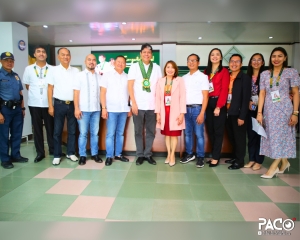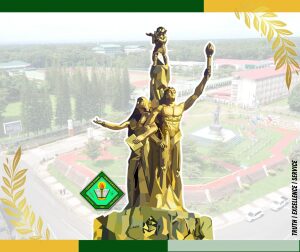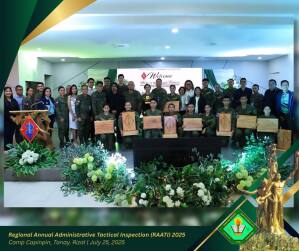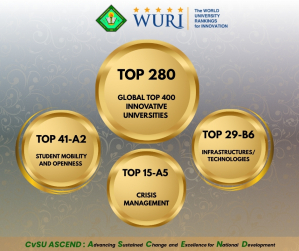![]()
HISTORY
The College of Education started as the School of Education (SEd) in 1992, with 44 faculty and 343 students, under the supervision of Dr. Constancia G. Cueno as the first Dean.
Initially, SEd offered the programs Bachelor of Secondary Education (BSE) with Mathematics, Biology, Chemistry, Home Economics and Technology, P.E. and Recreation, and Agricultural Arts as major fields; and Bachelor of Elementary Education (BEE) with Mathematics, Science Home Economics and Technology, General Education, Physical Education and Recreation, and Work Education as areas of specialization. It maintained the high school project, the Secondary Education Laboratory School as a laboratory school for its BSE students. The graduate program, Master of Arts in Education (Elementary Education, Secondary Education and Science Education with specialization Mathematics, Chemistry and Biology) was maintained in coordination with the Office of the Graduate Studies. In 1994, SEd started to offer Diploma in Hotel and Restaurant Management (DHRM). In 1995, it established a special project, the Child Development Center (CDC) which admitted elementary pupils, which eventually become a laboratory school for BSE and BEE students of the Teacher education Department.
In 1996, Dr. Lorna L. Penales was designated as the new dean of SEd. New developments were implemented. In 1997, the four-year degree program, Bachelor of Science in Hotel and Restaurant Management (BSHRM), began to be offered by virtue of the Board of Trustees Resolution No. 54, s. 1996. This was followed by the offerings of the two-year non-degree program, Diploma in Tourism Management (DTM), the Certificate in Garments Technology (CGT), the Certificate in Fibercraft Technology (CFT), and the Certificate in Cosmetology (CCoS). The Laboratory School Curriculum was also revised and changed to Science Curriculum. In 1998, SEd started to offer another degree program, the Bachelor in Physical Education (BPE). The doctoral program, Ph.D. in Education was also offered in coordination with the Office of Graduate Studies.
With the conversion of Don Severino Agricultural College into a state university, the Cavite State University, in January 1998, the School of Education was then eventually elevated into a college, the College of Education. In the same year, CDC was formally subsumed under CEd. However, CDC continued to finance its own personal services and other operating expenses. On the other hand, the Physical Education Department was elevated into a separate college, now called the College of Sports, Physical Education and Recreation (CSPEAR). CEd also established various income generating and instructional projects such as the Ornamental Garden, the CEd Science Mini-Centrum, and the University Bakeshoppe, the latter which functions both as an income-generating project and as laboratory for H.E. and HRM students. The College also fully operationalized the Multipurpose Quadrangle as the venue of the various functions and in-door activities in the University.
The year 1998 also saw the College preparing for Level I accreditation by Accrediting Agency of Chartered Colleges and Universities in the Philippines, Inc. (AACCUP) of its B.S.E. and B.E.E. Programs.
Preliminary survey of the two programs was conducted in 1999. In the same year, CEd started preparing two other programs, BSHRM and MAEd, for Level I accreditation (Candidate Status). Self-survey of both programs was conducted from June to August, 2000.
The year 2000 ushered in with new hopes for development and recognition for CEd. Its two programs, BSE and BEE were reviewed for formal survey by AACCUP. Both curricular programs were revised based on CHED Standards (CHED Memorandum Circular No. 11, s. 1999) and implemented during the first semester of school year 2000-2001.
In 2001, four programs were accredited by AACCUP. MAEd and BSHRM programs were awarded Candidate Status while BEE and BSE programs were awarded as Level I (Accredited). The College also began offering the Teacher Certificate Program (TCP) by virtue of the Board of Regents Resolution Number 40, s. 2001. In the same year, CEd began the operation of University Hostel, popularly known as the Hostel Tropicana which serves both as laboratory facility for BSHRM, DHRM, DTM and Home Economics Education students.
In 2003, the College started to offer Bachelor of Science in Tourism and Resort Management.
In 2004, Dr. Cecilia B. Banaag was designated as the Dean of CEd. In the current year, CDC was converted into a Science Elementary School and remained a Laboratory School for CEd BEE students. The CEd Research Journal was first published to serve as a venue of new developments and innovations in various fields in education.
In December 2005, both BEE and BSE programs were elevated to Level II (Re-accredited), while the MAEd and BSHRM programs were elevated to Level I (Accredited). In the same year, a state of the art audio-visual room was established to cater the needs of the students, faculty and community.
In 2006, Dr. Divinia C. Chavez was designated as the new dean of the College. In 2007, the Ph.D. in Education program was subjected for accreditation and was awarded Candidate Status by AACCUP. The Secondary Education Laboratory School was renamed to CvSU Science High School with greater emphasis on offering of the Science Curriculum.
In June 2008, the BSHRM with Certificate of Information System Management program was revised to BSHRM Straight and BSHRM Ladderized programs. In August of the same year, a great milestone happened in the College when its Dean, Dr. Divinia C. Chavez became the new CvSU President. The full operation of the College eventually became directly under the leadership of Dr. Ma. Agnes P. Nuestro designated as the new Dean of the College.
The year 2009 is the period of continuous development and brighter future ahead in terms of instruction, research, extension, infrastructure, resource generation and internationalization as it strives to emerge as a Center of Excellence in Education.
In 2011, Dr. Rhodora S. Crizaldo was designated as Dean of the College of Education upon the designation of Dr. Ma. Agnes P. Nuestro as Vice President for Academic Affairs. During her headship, the Bachelor of Science in Tourism and Resort Management (BSTRM) was revised to Bachelor of Science in Tourism Management (BSTM). Likewise, two (2) programs were qualified for Level III status namely Bachelor of Secondary Education and Bachelor of Elementary Education. Further, two (2) were awarded Level II re-accredited programs namely Master of Arts in Education and Bachelor of Science in Hotel and Restaurant Management and two (2) were Level 1 accredited programs namely Doctor of Philosophy in education and Bachelor of Science in Tourism and Resort Management.
In 2013, Bachelor of Secondary Education and Bachelor of Elementary Education passed the CHED Regional Quality Assessment Team (RQAT). The two programs were also awarded second phase Level III Re-Accredited status in the same year.
In 2014, the PhD in Education Program received the Level II Re-Accredited status. While in 2015, the BSTM Program undergone and passed the Level II Re-Accredited status and the BSHRM program were qualified for Level III accreditation. Moreover, the MAEd program was awarded with Level III accreditation status.
In 2016, Dr. Editha G. Reyes was designated as Dean of the College of Education upon the designation of Dr. Rhodora S. Crizaldo as Vice President for Academic Affairs and OIC President of the University. The College has actively maintained its linkage with 48 hotels and restaurants and other establishments and 52 cooperating schools for the On-the-Job Training and Student Teaching Internship of the HRM and Tourism and Education students, respectively.



